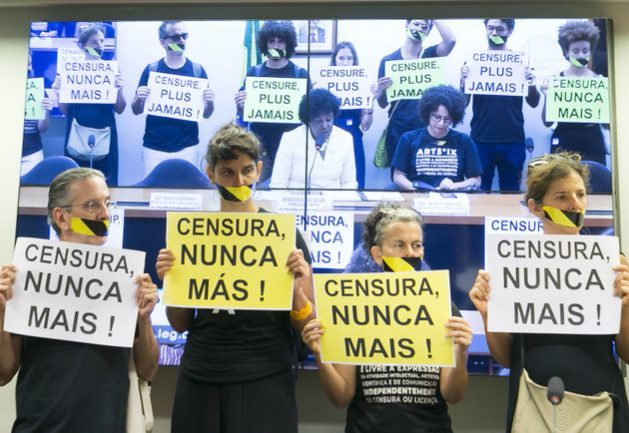It's Disinformation, Stupid!

CARACAS, Mar 18 (IPS) - During his 1992 run, Bill Clinton, then elected US president, made "It's the economy, stupid!" a household phrase. Coined by campaign advisor James Carville, it pointed out economic and health issues as part of the strategy resulting in the accession of this relatively obscure governor of Arkansas into the White House.
From time to time, this phrase experiences mutations. For this piece, it morphs once again to draw attention to disinformation, an invisible web of sorts wrapped around today's societies, mostly in Western democracies, where free press has traditionally been one of the pillars of the political system.
Censorship and disinformation seem to go hand in hand with authoritarian regimes. China's model is more geared towards a logic of strict control over what the population reads, sees, or hears; and technology has resulted a fine-mesh sieve for consolidating this model. The aim is to prevent the Chinese society from being informed, accessing information deemed sensitive or dangerous by the regime, that is to say, leaving citizens none the wiser.
Meanwhile, Russia has been developing its own disinformation scheme. More than censoring content, the objective is to flood the public with versions, most of which false, thereby encouraging confusion among citizens. This model seems to aim at shedding doubt on everything and taking nothing for certain.
On a visit to Caracas, Venezuela, American historian and journalist Anne Applebaum gave a clear example of how this Moscow-generated disinformation logic works. She looked into the case of Malaysia Airlines flight 370, with a presumed death toll of 239 passengers in 2014, in an interview for local news site Prodavinci: The information ecosystem was flooded with hundreds of theories, so that, ultimately, nobody would believe anything or knew whom to believe. The goal is to discredit them all. After these versions were circulated, the role of the Russian army in the death of the Malaysia Airlines passengers was just another idea floating on a tide of falsehoods: Objective accomplished.
Towards late 2019, two global organizations defending freedom of expression, with clear differences in emphasis and perspective, agreed to denounce disinformation as a serious threat to democracy in current times: Paris-based Reporters Without Borders (Reporters Sans Frontières, RSF), and Freedom House, with offices in Washington, D.C., and New York.
RSF, for its part, highlighted how 2019 closed with the fewest journalists killed in a decade and a half worldwide. Nevertheless, this does not equate to an improvement in global freedom of expression. For this organization, Russia's president Vladimir Putin is one of freedom of expression ‘predators', and Russian citizens are held hostage to this scheme turned Moscow's newest worldwide export, disinformation.
RSF 2019 World Press Freedom Index on Russia warns: "As TV channels continue to inundate viewers with propaganda, the climate has become very oppressive for those who question the new patriotic and neo-conservative discourse ".
Freedom House, meanwhile, noted in its 2019 Freedom on the Net worldwide report that governments around the world are increasingly tapping into social media to manipulate elections and monitor their citizens. This report shows how at least 40 of the 65 countries assessed have advanced social media surveillance software in place to that end.
Disinformation, a sort of good ol' censorship at its upper stage, is a challenge reaching beyond groups of journalists and media outlets today. The world's democratic governments can no longer stand idly by as this phenomenon spreads. And, in my opinion, this is not a question requiring a response from the bench or the Legislative.
Social media today are literally swamped with fake news, hard-to-check information. Everything colludes to make the citizen ill-informed. At a time when societies seem over-informed, they are indeed suffering from disinformation.
We are at a tipping point in the field of information. On the one hand, mainstream media – press, radio, and television – are experiencing a period of uncertainty, since a successful, long-term business model is still uncertain; and, on the other hand, citizens' search for information on social media is gaining ground.
In this regard, democratic governments and concerned endowments must support independent journalism so that it gains self-reinvention capabilities, as free mass media are a guarantee for democratic living. Likewise, there is an urgent need to boost independent studies conducted by universities or NGOs on disinformation and fake news in order to produce documentary evidence of what is happening.
Finally, we must take up educating audiences to develop a critical eye. This would be a fundamental step when standing up to the challenges posed by this new ‘Disinformation, TMI Age'.
Andrés Cañizález, Venezuelan journalist and doctor of political science. Researcher at Andrés Bello Catholic University. According to Google Scholar statistics, he is the highest-impacting Venezuelan analyst on the web with his texts on freedom of expression and journalism. He has been founder of the first fact-checking media and fake news observatory in his country
© Inter Press Service (2020) — All Rights Reserved. Original source: Inter Press Service
 Global Issues
Global Issues